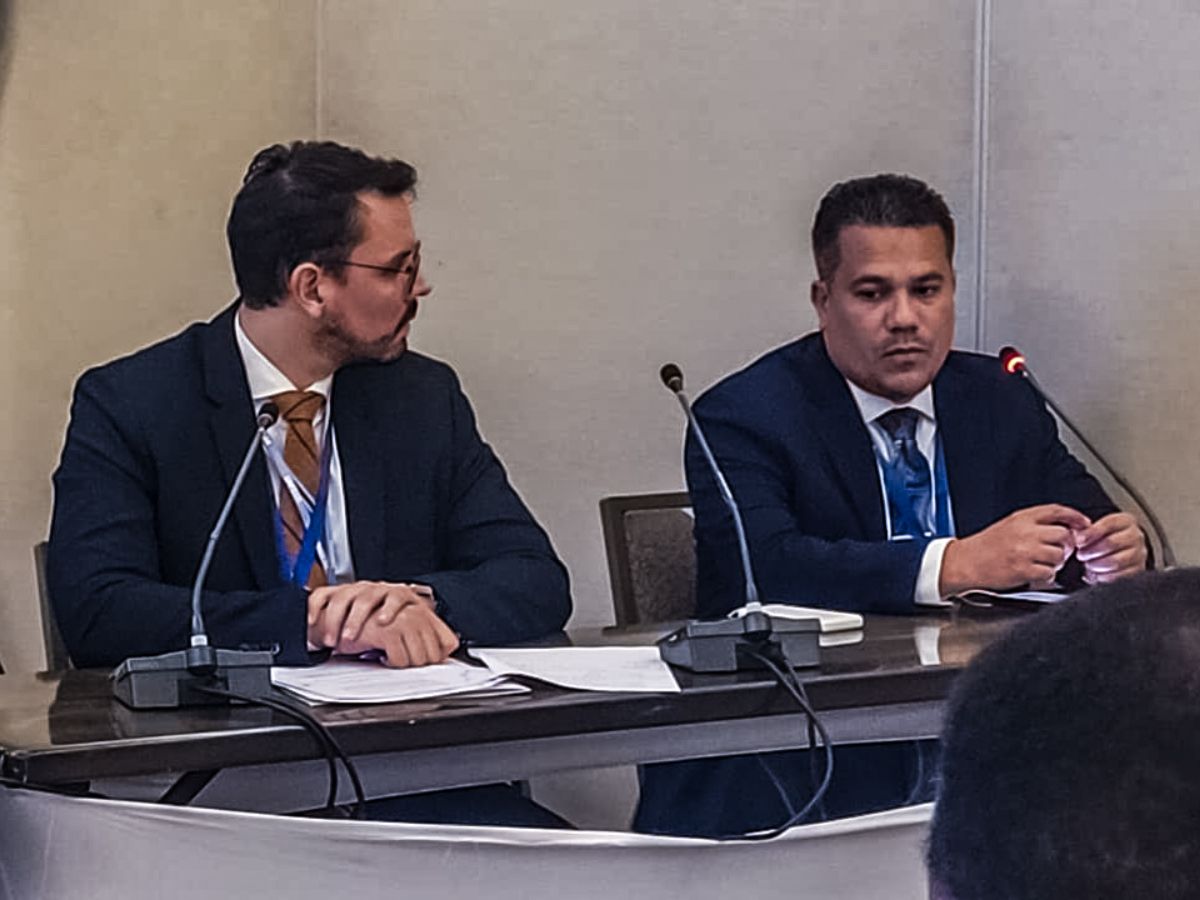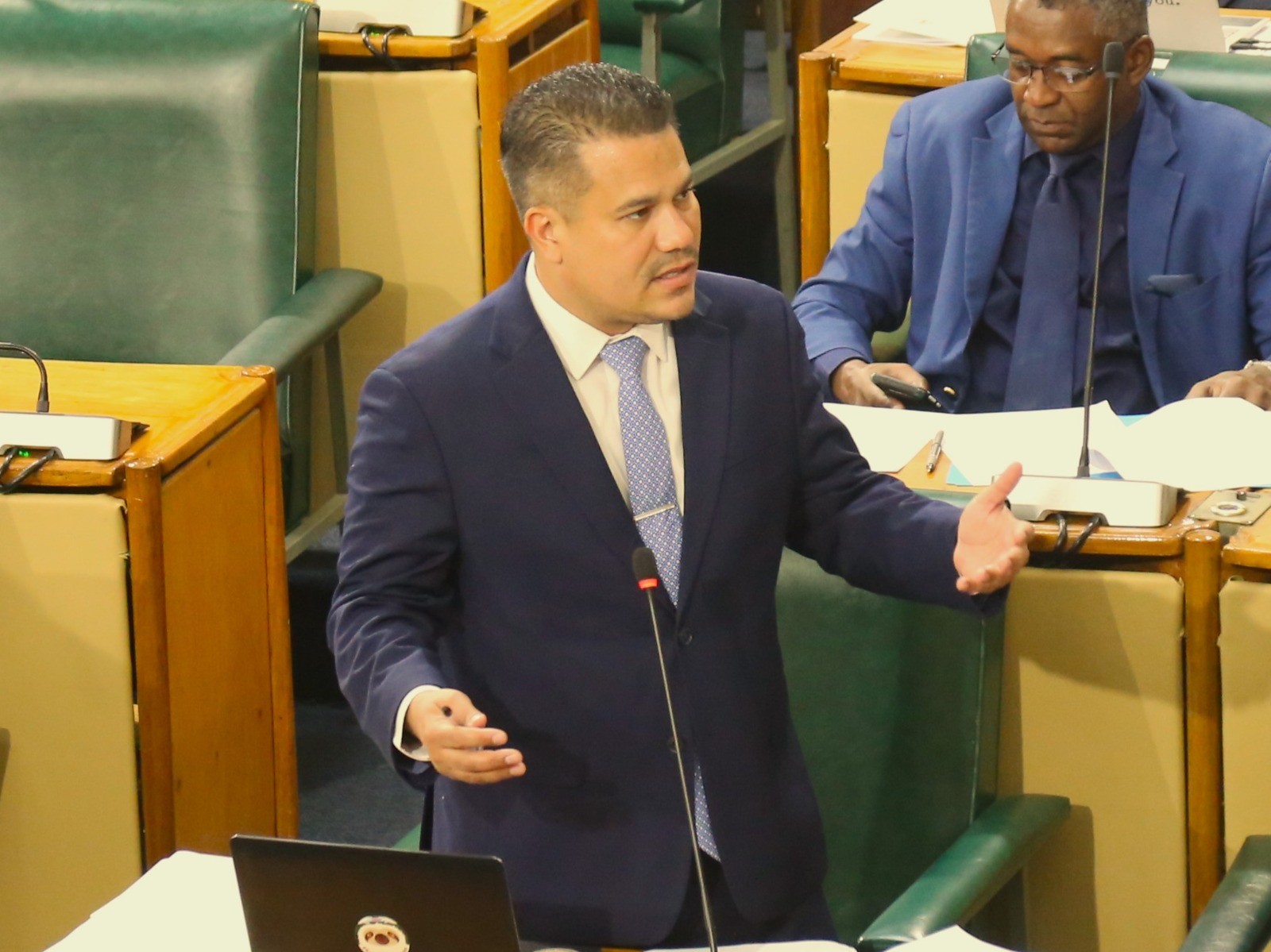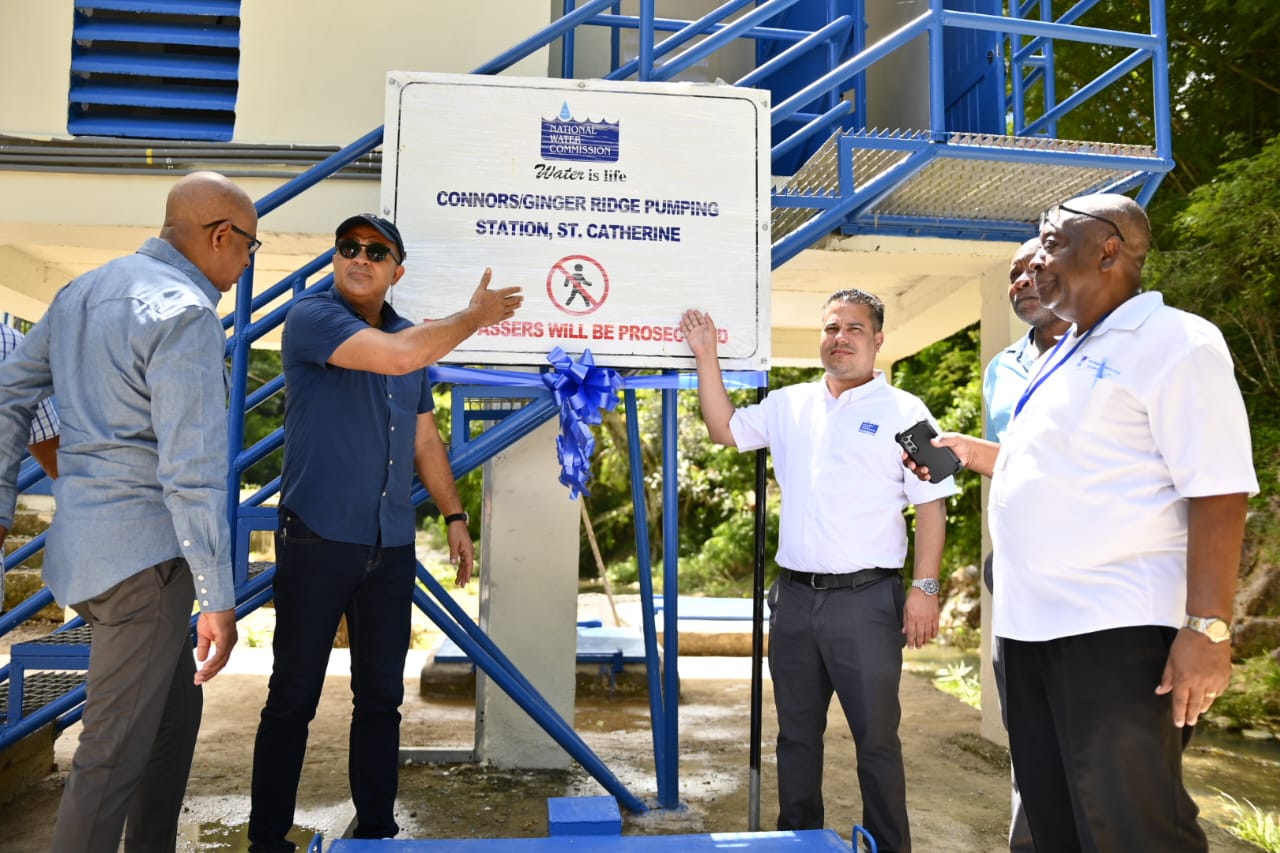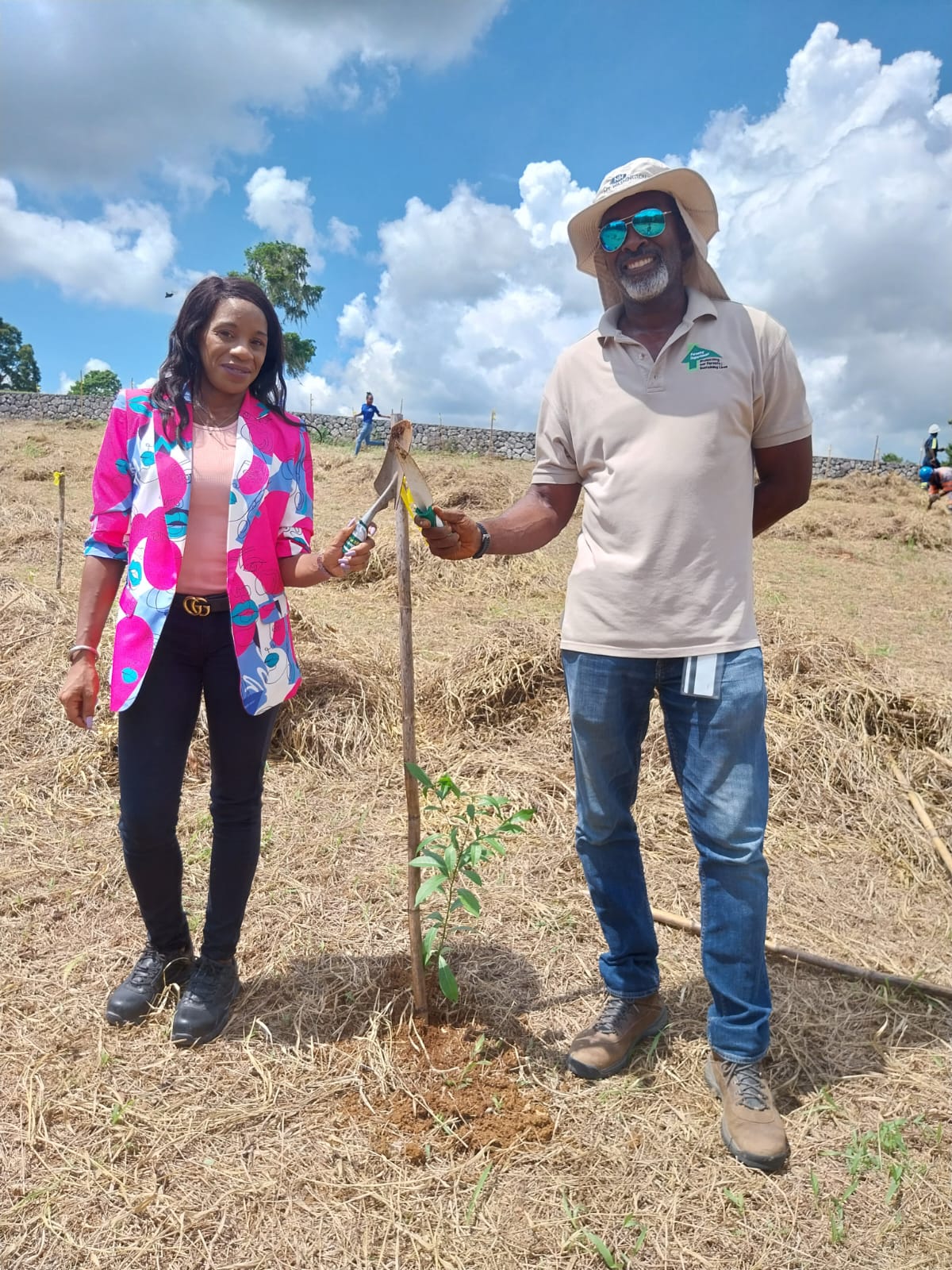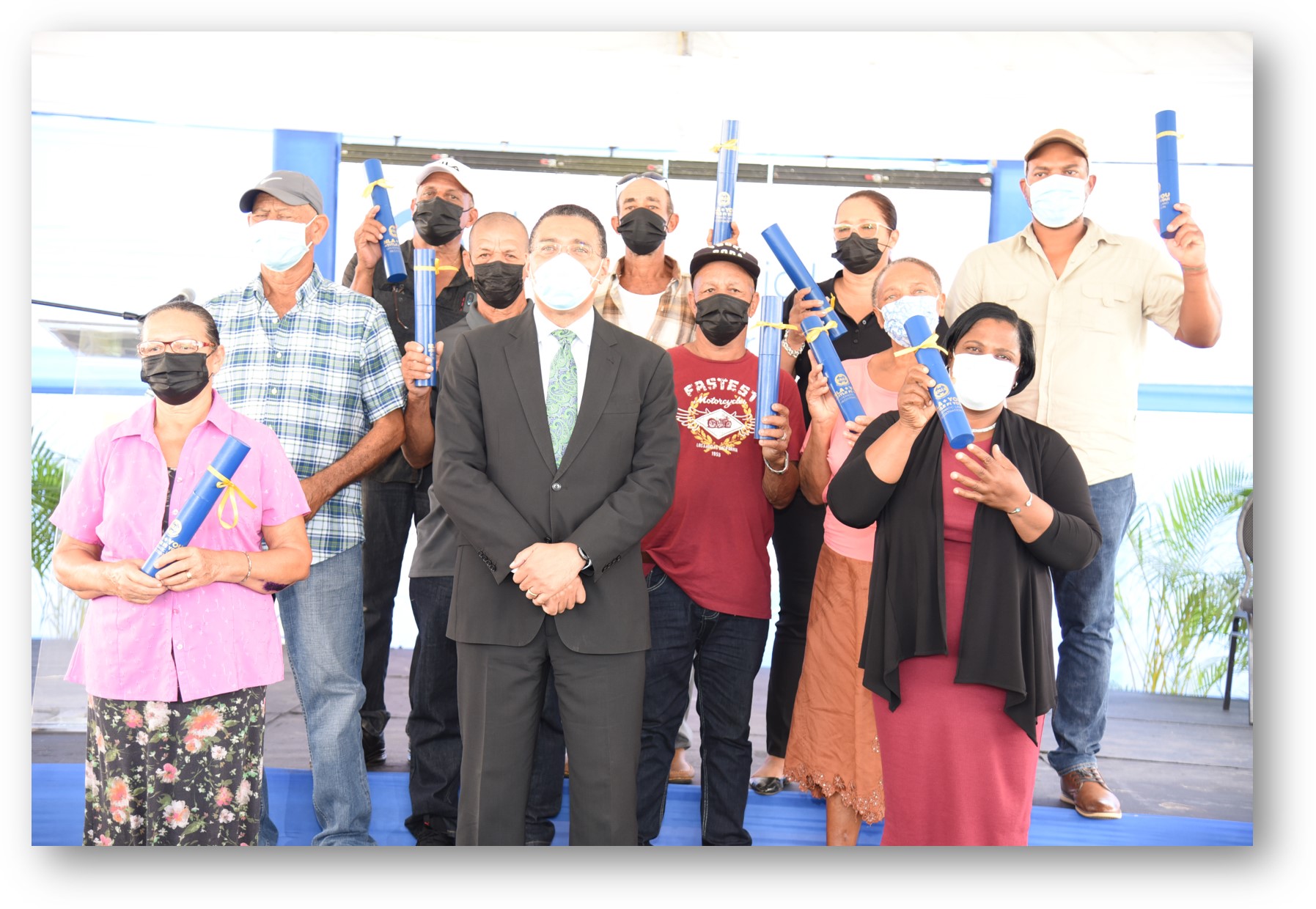Minister without Portfolio in the Ministry of Economic Growth and Job Creation, Senator the Hon. Matthew Samuda, says that Jamaica continues to invest in technology and develop mechanisms that enable the country to mitigate the risks associated with climate change. He says the country has a long way to go but there is political commitment and technical expertise to implement the required systems. “Jamaica is no less vulnerable…we have a long way to go if we are to bring political commitment to meet with investment to meet with implementation. But we certainly can acknowledge that there is political will, there is technical expertise to ensure that we complete these early warning systems,” stated Minister Samuda. Minister Samuda was addressing a session, yesterday (October 24, 2023), organized by the Caribbean Meteorological Organization (CMO) at Latin America and the Caribbean Climate Week being held in Panama City. “Through the Ministry of Economic Growth and Job Creation, which falls under the Prime Minister, we have launched a few mechanisms that force agencies and MDAs (Ministries, Agencies and Departments)generally to work together. One is the Integrated Water Resource Management Council (IWRMC) which brings all things water, all things weather together into regular quarterly meetings” the Minister noted. He noted however that the drought conditions over the last three years have impacted the country’s mitigation efforts. “Through the cooperation with the Meteorological Service and the Water Resources Authority (WRA), the government is moving to develop early warning systems and long-term measuring metrics to ensure that we know where we are. The issue Jamaica has had over the last three years is chronic droughts. So the need for coordination and using the systems is important but after going through an extended drought period an afternoon shower can set off an alarm for the Met Service because unexpected rainfall can become a flood.” He explained that “what we now have is the skewing of norms. The statistical norms no longer allow you to predict how your systems will react to normal weather events, and that is why coordination is so particularly important. It is through this cooperation that we are looking to develop early warning systems and long-term measurable metrics to make sure we are sharing these”.Other mechanisms cited by the Minister include the launch of the Building Resilience Through Climate Adaptation Technologies (BReTCAT) project, the launch of the Met Service’s weather app, the Bush Fire Warning Index, as well as the Jamaica Systemic Risk Assessment Tool, as important mechanisms in increasing the island’s response to risk and building its resilience to climactic impacts. He pointed to the country’s intention to digitize its networks over the next three years, including rain gauges as well as hydrological meters, and added that the new S-Band Doppler Radar was nearing completion. The session by the CMO coincided with its 50th anniversary celebrations. Jamaica is one of the founding members of the CMO. –30–
Category: News
Increase in system inflows due to the recent rainfall, but Jamaicans still urged to Conserve
The recent increase in rainfall has resulted in increased inflows to many National Water Commission (NWC) sources across the island, but the island is not yet out of the woods in terms of the drought. Minister without Portfolio in the Ministry of Economic Growth and Job Creation, Senator, the Hon. Matthew Samuda, in updating Friday’s (October 13) sitting of the Senate on the drought situation, noted that the figures as of Thursday, October 12, 2023, indicated that the recent rainfall had resulted in increased inflows to some systems “We have seen some turnaround because of increased rainfall in St. Thomas and certainly in the Blue Mountains. The Mona Reservoir is back at 78.5 percent. The Hermitage Dam is now operating at 100 percent. So we are starting to see a reduction in pressure on the NWC and its varying systems. As a result of that, and because the inflows in many cases are now exceeding the outflows, the NWC as at last week Friday was able to remove the prohibition orders”. Minister Samuda added that although the prohibition orders are lifted, restrictions will remain in place, particularly for the Mona Reservoir which will need to reach 80 percent of storage capacity before restrictions can be lifted. Despite the “light at the end of the tunnel” for Kingston and St. Andrew, Minister Samuda pointed out that other systems are still experiencing inflows that are significantly below their normal levels, particularly in the Eastern Parishes of St. Mary and Portland. As such, the Minister noted that the Government, through the NWC, continues to closely monitor and manage the water supply situation across the island. The Minister added that measures were being put in place to mitigate the effects of drought in the future. “There are many steps that we will take in coming years, to ensure that this discussion is not the same discussion happening in 2030. I’ve outlined some of the major investments that will deal with the eastern end of the island that is the Content Water System for 15 million gallons a day. Now I could get into more specific smaller ones, but to note even with the current drought which has been the worst Kingston and St. Andrew has ever experienced, the shortfall was less than 12 million gallons a day”. Minister Samuda said although the island was experiencing some rainfall, the sporadic nature of the rainfall meant that even when restrictions are lifted, citizens should make efforts to conserve their use of water.
-30-
Jamaica participates in launch of Regional GeoStats Awareness Programme
Jamaica, through the National Spatial Data Management Branch (NSDMB) of the Ministry of Economic Growth and Job Creation, yesterday (October 12, 2023) participated in the launch of the regional GeoStats Awareness Programme.
The Programme, which was launched virtually under the theme “Caribbean Together-Everyone Counts”, is aimed at fostering interest, understanding and engagement among youths in the Caribbean about the use and benefits of Geographic Information Science, geospatial technologies and statistics.
According Ms. Simone Lloyd, Acting Principal Director of the NSDMB, the overarching goal of the event was to increase awareness among young people, about the role of geospatial statistics in understanding the relationships between the economy, the society and the environment towards the decision-making process.
“Jamaica acknowledges the vast benefits to be derived from the integration of geospatial and statistical information through collaborations forged by the geospatial and statistical communities throughout our region. Where better to start than to target educators and students of Social Studies, Geography and Information Technology, at the primary, secondary and tertiary levels, across the Caribbean so that they are inspired to pursue geospatial and statistics driven career paths”, she noted.
Ms. Lloyd further noted that the NSDMB will be promoting the programme locally during Geography Awareness Week and at the 21st staging of GIS Day at the University of the West Indies Mona Campus on November 15.
She added that there will also be a GeoStats Competition, and the NSDMB would provide mentors to support the interested schools and students as well as in other training and educational activities.
“We will be supporting the webinars and training sessions that will target the students, helping them to develop the related knowledge and skills competencies”, she stated.
Participants in the launch came from Antigua and Barbuda, Barbados, Bahamas, Belize, Guyana, Jamaica, Trinidad and Tobago, St. Lucia, the United Kingdom and the United Arab Emirates.
The main partnering organizations in the GeoStats Programme include the UN-GGIM Americas, the Caribbean Geospatial Development Initiative (CARIGEO), the United Nations Economic Commission for Latin America and the Caribbean (UN ECLAC), the Organization of Eastern Caribbean States (OECS), and the Caribbean Community (CARICOM).
-30-
Sandy Ground, Connors and Ginger Ridge in St. Catherine receive piped water for the first time
The Sandy Ground, Connors, and Ginger Ridge communities in West Central St. Catherine, are now receiving piped water formally for the first time from the National Water Commission (NWC).
This follows yesterday’s (October 11) official commissioning of the Connors-Ginger Ridge pipeline project by Minister without Portfolio in the Ministry of Economic Growth and Job Creation, Senator the Hon. Matthew Samuda.
The project, that was implemented at a cost of $94 million, involved the construction of a 13,000-gallon sump and elevated pumping station and other pipelines of various lengths from Connors to Ginger Ridge to serve approximately 1,450 residents of the communities.
The project, which was constructed by Rural Water Supply Limited (RWSL), in partnership with the NWC, also involved the construction of a 10,000-gallon Concrete Tank at Ginger Ridge, and the rehabilitation of a 5,000-gallon Steel Tank at Sandy Ground.
Minister Samuda noted that the investment is one that the Government is proud of, as it seeks to meet its 2030 goals of increasing access to potable water for all Jamaicans.
“This is a step into the 21st century. This is new pipelines, this is new storage capacity, this is new processing capacity. The government is committed to an all-island overhaul of our water systems to significantly increase the capacity of these systems, and to ensure that all of our citizens are able to look past the basic standard of living”, the Minister stated.
Some sections of the area benefitted from a parochial piped water system for decades, but the residents will now receive a 7-day water supply through the 9km of transmission and distribution line.
Water will be sourced from the spring source into the pumping network which has a design capacity of 50,000 gallons of water per day. Treated water will be pumped to the Sandy Ground tank and the Ginger Ridge tank facilities for distribution and connections were installed at homes in Connors and Ginger Ridge.
Under the RWSL and the NWC partnership, the rainwater harvesting system at the Ginger Ridge Primary School will also be upgraded to facilitate access to the NWC’s potable water network.
Minister Samuda pointed to the need for “hundreds more” of these systems, especially given the impacts of climate change, noting that over the last year, Jamaica experienced one of the worst droughts in its history.
“The concept of climate change is not a foreign concept, it’s not a future concept, it’s one that we’re living. Our adaptation cost for water is in excess of US$3 billion so when you hear the NWC ask that you formalize your connections and pay your water bill, it is in recognition that we are in a race against time to achieve our development goals, but we’re also in a race against time to make sure that we build in the resilience to not just connect everybody but to make sure our water sources are protected”, the Minister explained.
–30–
Forestry Department and JMB Announce Partnership to Plant 20,000 Trees
A 5-year partnership to plant 20,000 trees between the Forestry Department and the Jamaica Bauxite Mining (JBM) Limited was launched during this year’s National Tree Planting Day ceremony at the JBM’s Protocol House in Lydford, St. Ann.
Following the announcement, guests planted 1,000 trees signaling a strong start to this partnership. Mr. Ainsley Henry, CEO and Conservator of Forests, who is pleased with the partnership, said, “Large-scale planting of trees signals good things for expanding our tree cover and what with the recent lengthy and record-breaking period of heat and drought experienced across Jamaica, we certainly need it”.
This partnership is part of a strategically aligned effort by JBM, over the next 3-5 years, as part of its reclamation and sustainable restoration of mined-out lands efforts. Mrs. Donna Howe, Managing Director of JBM, said National Tree Planting Day “aligns and identifies with our environmental social governance objectives, and “JBM is getting behind a number of these types of environmental and socially impactful projects”.
Mrs. Howe added that its tree planting goals support the United Nations Sustainable Development Goals of sequential land development as custodian owners of lands in St. Ann. The bauxite company planted 1,000 trees at the National Labour Day Project in May of this year and will plant an additional 2,000 trees by the end of the 2023/2024 financial year.
National Tree Planting Day was celebrated under the theme, “Keep the Heat Away… Plant a Tree Today!”
More than 100 volunteers including JBM staff, political representatives, schools in St. Ann and other partners, joined efforts to plant 1,000 trees on the Beulah Park property. This was among several tree-planting projects supported by the Forestry Department today. Tree planting was also done at the Frome Technical High School in Westmoreland, Kingston High and McNie All Age in Clarendon. We also partnered with the Northern Rio Minho Local Forest Management Committee to plant 500 trees at the Bull Head Forest Reserve and with Total Energies to reforest two hectares in New Danks Clarendon. Entities such as Jamaica Red Cross, DiCawna Library, Cemex and Caribbean Tree Planting Project also led tree planting activities, which will all count towards the 300,000 trees targeted for planting under the National Tree Planting Initiative by year-end.
The Agency aims to complete the #3milliontrees target by December 31, 2023, and appeals to the public for its support – not just to meet the target but to help build a climate-resilient Jamaica, increase forest cover, and establish high-value green spaces for its citizens.
National Tree Planting Day is celebrated on the first Friday in October annually. Through the annual National Tree Planting Day seedling distribution, the Agency makes tree planting an accessible activity in which anyone can participate. The seedling distribution, which started on September 25 and ends on October 13, offers free seedlings to the public to plant trees on National Tree Planting Day or within the distribution period. Individuals can visit any of the Agency’s nurseries in Constant Spring, Moneague and Williamsfield to collect up to 10 free ornamental and timber seedlings. Coordinators of larger projects who require more than 10 seedlings, can email fdinfo@forestry.gov.jm to make their request.
Contributed by the Forestry Department – https://www.forestry.gov.jm/newsDetails?newsID=104#
–30–
NLA issues over 8,000 Titles under its Systematic Land Registration Programme
The National Land Agency (NLA) is reporting that it has issued over 8,000 Titles under the Systematic Land Registration Programme since the programme began in 2021.
The Agency was mandated by the Government to deliver a total of 20-thousand Titles in three years. Of this number, 12,000 are to be issued under the Systematic Land Registration Programme.
“The National Land Agency has issued a total of 12,224 Certificates of Title; 8,284 of which have been issued via the Systematic Land Registration Programme”, disclosed Ms. Shalise Porteous, Senior Director of Adjudication Services at the NLA.
Systematic Land Registration (SLR) is the methodical and orderly registration of parcels of land in a designated area known as the Systematic Adjudication Area.
The project is currently being administered in St. Elizabeth, St. Catherine and Manchester, and over one hundred communities have been declared as Systematic Adjudication Areas.
Ms Porteous says the programme is bearing fruit.
“This data is proof that the Systematic Land Registration process works, as more Certificates of Title have been issued from this programme when compared to any other land titling initiative in this country.”
The Adjudication Services Division of the NLA assists landowners who have been in undisturbed and undisputed possession of their land for twelve years or more, to claim ownership via the Systematic Land Registration Process.
Under the Systematic Land Registration Project, persons no longer must visit the NLA to apply for a registered Title. Instead, representatives from the NLA visit the declared communities, to adjudicate the land rights and interests of the residents.
–30–
Montgomery Well to boost Corporate Area water supply by up to 2 million gallons daily
The National Water Commission (NWC) is re-activating the Montgomery Well, off Marescaux Road in Kingston, which will provide an additional one to two million gallons of potable water daily, to sections of the Corporate Area.
Minister without Portfolio in the Ministry of Economic Growth and Job Creation, Senator the Hon. Matthew Samuda, visited the site yesterday, where work is ongoing to activate the well.
He was joined by Member of Parliament for South Eastern St. Andrew, Julian Robinson, and Councillor for the Trafalgar Division, Kari Douglas, as well as senior members of staff of the NWC and the Ministry.
Minister Samuda noted that the work to put the well back into operation is a major initiative in the NWC’s drought mitigation efforts.
“In February this year, KSA received 8 percent of its 30-year average of rainfall. It means the NWC has had to be creative. It has had to work around the clock and had to look at resources that were resting. Earlier in the year, we would have also brought on stream the Long Mountain Well to provide close to another million gallons into the system, to reduce the pressure on the Mona System”, he stated.
Minister Samuda noted that the Montgomery Well would benefit the Cross Roads area extending into Downtown Kingston and its environs.
Meanwhile, Acting Corporate Public Relations Manager at the NWC, Delano Wiliams, noted that work on the Well, in which the NWC is investing some J$25 million, started months ago, and is now at an advanced stage.
“Water is being pumped from the well to get out any debris, so it is clean and clear and then we move towards what we call a step test, to measure the volume of water that comes out”, he noted.
The Well will be in service by December, and should effectively reduce the impact of the traditional dry period in January and February, as well as the drying effects of the ‘El Nino’ phenomenon, which scientists predict will last for another 4-5 years.
–30–
NWC pipelaying works to benefit 40-thousand customers of Jericho and surrounding communities in North-West St Catherine
Approximately 40 thousand National Water Commission (NWC) customers in Jericho, Ewarton, Mount Rosser, and other communities in North West St. Catherine, should see significant improvements in their water supply by December 2023.
Minister without Portfolio in the Ministry of Economic Growth and Job Creation, Senator the Hon. Matthew Samuda made the comment yesterday (September 29), during a tour of major pipelaying and other infrastructure works being carried out in the area, by the NWC and the Ministry of Economic Growth and Job Creation.
According to Minister Samuda, the project represents J$125 million of investments, in improving the water infrastructure in Jericho which includes the installation of pipelines from the Jericho well facility to the main road and the interconnection of the pipelines into the existing network.
“That investment includes new 16-inch distribution mains. There are also 6-inch distribution mains that are being put in at the community level. We’ve also put in pressure reduction valves that help us to reduce breakage in the lines and we’ve also done significant work on the pumphouses to ensure that the pumps are at a capacity that serve the number of citizens in this area”, the Minister noted.
Minister Samuda added that the work on the pumps and the well, to supply water through the pipeline would result in savings for the NWC.
“That pump is a major investment because it’s ultimately going to trigger savings for the NWC in excess of 70 million Jamaican dollars annually. We used to pull water in this area from a private source. We no longer have to do that, as we are able to find our own well and put in place the investments. It is a 300-meter-deep well. It will pull some 2 ½ million gallons a day for the citizens here. So not only are we providing a more reliable water supply to our citizens, we’re also saving the Water Commission money. So that allows us to pay back for this project within two years”, the Minister stated.
Minister Samuda further noted that persons in the community are already receiving water, as some upgrading had already been carried out on the pumps and on some of the lines. However, he urged persons who are not connected legally to the NWC’s pipelines to do so.
“We are doing our part. We’re going to need the citizens to do their part, so those who are not connected to the network, we are going to be working with them to get them on to the network legally”, the Minister noted.
Noting that road reinstatement is included in the project, Minister Samuda urged the travelling public to be patient as the pipelaying works progress.
“800 meters of pipe is being laid. We know that it is particularly hard on the taxis in the space, so we ask them to pardon our progress. We are working as quickly as we can, to ensure that the road is restored”.
–30–
Jamaica’s sound fiscal management credited for availability of Climate Finance
Jamaica has benefitted from climate finance due to its sound fiscal management, but much more is needed to meet its needs for climate resilience. Minister without Portfolio in the Ministry of Economic Growth and Job Creation, Senator the Hon. Matthew Samuda, made the comment today, during a panel discussion on ‘Scaling up Climate Finance: Investment for a Livable Planet’ during the 78th General Assembly of the United Nations in New York. “Currently, we have in place a $764 million facility with the IMF, which is targeted at resilience and sustainability. This is focused at decarbonizing our economy as well as building the resilience both physically and fiscally within our space. We also have a $960 million emergency facility that we can draw down should we have any catastrophes. Additionally, we were the first country in the Caribbean to have a CAT Bond, which is valued at US$175 million”, he noted. On the subject of Jamaica’s Nationally Determined Contributions (NDCs), Minister Samuda noted that the updated NDCs were primarily geared towards significantly reducing the country’s carbon footprint. “We expect that half of our energy will be produced by renewable sources by 2030. We will start a 45-megawatt floating solar system over our largest reservoir within weeks. Our water system is the largest user of electricity in Jamaica, so it’s very important that we start to decarbonize that. We will also go to market for 100 megawatts of clean energy production”, he said. However, he added that the process of financing projects of this nature is difficult, particularly for Small Island Developing States (SIDS), like Jamaica. “As SIDS, we really have a capacity gap. It’s understood, but it (the funding) has not helped sufficiently, because ultimately to build the sorts of transactions that do facilitate the crowding-in of finance is difficult, and when you have a small public bureaucracy developing those sorts of programmes, it’s difficult”, the Minister noted. Minister Samuda added that it is essential to move quickly with capacity support, to ensure that SIDS and Least Developed Countries (LDCs) are able to take advantage of opportunities for resilience.
–30–
Part A of the Southern Coastal Highway Improvement Project officially opened
The much-anticipated Southern Coastal Highway Improvement Project (Part-A), from May Pen to Williamsfield, was officially opened today (September 14, 2023), by Prime Minister, the Most Hon. Andrew Holness during a ceremony at the new Toll Gate Plaza in Clarendon
The SCHIP Part A involved the construction of a brand-new four-lane divided highway, connecting May Pen to Williamsfield, and the transformation of the existing Melrose Hill Bypass into a four-lane divided highway.
Commuters can now look forward to a drastically reduced travel time of approximately 15 minutes along this route, contributing to enhanced connectivity, convenience and productivity.
In his address at the opening ceremony, Prime Minister Holness noted that the new highway will increase productivity.
“This road is a step in improving the general quality of life for all Jamaicans, a step in improving the productivity of all Jamaicans and you can easily measure the productivity gain of this road, by the productivity loss in traffic, discomfort and the aggression it creates in driving on some of the other bad roads” the Prime Minister asserted.
According to Prime Minister Holness, a critical aspect of the project involved what is known as the “defects liabilities phase”.
“We’re not just building the road and then when the contractor leaves, that’s the end of it. There is a two-year defects liability period where China Harbour Engineering Company will be responsible for any construction-related or design-related defects on the infrastructure”, stated Prime Minister Holness.
He added that other considerations are given when constructing roads across the island.
“When we build roads we put in water mains, that are not just designed to treat with the population that exists now, but we are planning for populations to come. So, we are investing in significantly large water mains and not using old materials. We are using materials that will last hundreds of years. We are putting in fiber-optic cable. We are putting in other sensors in the road. Where necessary and possible, we put in sewage. But if you look at the roads that we are building today, you will see massive civil infrastructure investment…These roads will last your lifetime, and your children’s lifetime, and their children’s lifetime”, the Prime Minister stated.
Meanwhile, Minister with responsibility for the Works portfolio, Hon. Everald Warmington, described the newly completed highway as a testament to the Government’s unwavering dedication to the people of Jamaica.
“This leg of the highway represents more than just concrete, steel, and asphalt. It signifies development progress, connectivity, and the promise of a brighter future for all those who traverse the south coast of this country”, he noted.
Work on the 28-kilometer stretch of road, was completed by China Harbour Engineering Company, with oversight provided by the National Road Operating and Constructing Company (NROCC), an agency of the Ministry of Economic Growth and Job Creation.
–30–


